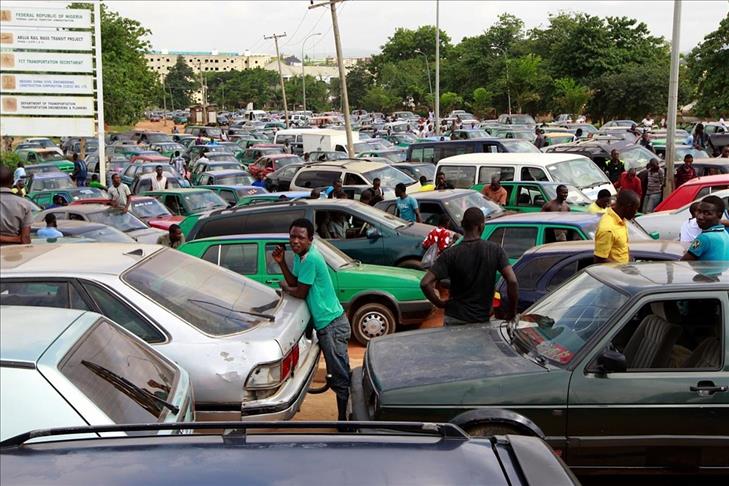
by Andrew Jay Rosenbaum
ANKARA
While Nigerian fuel marketers have agreed to resume distribution after fuel shortages brought the country to its knees, the chronic issues that dog business in Nigeria still are not addressed.
Nigeria ranks 127 out of 144 countries on the World Economic Forum's Global Competitiveness Index for 2014 to 2015, down one slot from 127 in the previous year.
"Institutions remain weak, with insufficiently protected property rights, high corruption, and undue influence," the index report commented.
The dispute with fuel marketers could fall under "insufficiently protected property rights," or it could be in the category of "high corruption," but no one seems to know.
On Tuesday, the marketers took a ₦159 billion payment ($798.8 million) payment from the Nigerian Finance Ministry in exchange for releasing vehicle fuel supplies.
The ministry had, at first, insisted on the right to verify the validity of the subsidy payments demanded by the marketers, but the fuel shortages, which crippled banks, airlines, and even telecommunications, along with cars and trucks across the country, apparently took priority. Businesses in Nigeria depend on fuel-powered generators for electricity, as the national power grid is unreliable.
On Monday, Finance Minister Ngozi Okonjo-Iweala had denied that subsidy payments were owed. The minister said the marketers had received rolling installment payments.
President-elect Muhammadu Buhari, who is to be inaugurated on Friday, also said that he "knew nothing about the subsidies," in an interview with the Nigerian newspaper Sunday Trust.
"I served for three and a half years under General Obasanjo as minister responsible for this industry. When people start talking about this subsidy I honestly get confused. I will tell you this, and I hope it will answer what you want to know. Back then we had a refinery in Port Harcourt, which was refining 30,000 barrels a day of Nigerian crude. Later, it was upgraded to refine 100,000 barrels a day," Buhari said.
"Another refinery was built in Port Harcourt to refine 150,000 barrels per day of Nigerian crude. So, Port Harcourt alone had the capacity to refine 250,000 barrels per day of Nigerian crude... I set up another refinery in Warri for 100,000 barrels per day of Nigerian crude and the Kaduna refinery a 100, 000 barrels per day. So Nigeria built capacity to refine 450,000 a day."
Olusegun Obasanjo served as Nigeria’s military ruler from 1976 to 1979 and as president from 1999–2007.
Asked why the refineries are producing at less than half their capacity, Buhari said: "You can’t defend these corrupt and incompetent people. You can’t defend them."
- Refineries fall into disrepair
Even though it is Africa’s biggest crude producer, pumping about two million barrels of crude a day, Nigeria has to import nearly all its fuel, despite having four operating refineries which should be producing fuel for the country. The oil refineries described by Buhari are in disrepair.
In an interview with Platt's oil daily on January 14, former Minister of Petroleum Resources, Diezani Alison-Madueke explained why Nigeria’s four refineries in Port Harcourt, Warri and Kaduna have still not undergone repairs more than four years after their original builders completed the technical assessments on them.
Turnaround maintenance scheduled had not taken place due to the level of decay at the plants, Alison-Madueke said.
After assuming office in 2007, the minister said she carried out an extensive tour of the refineries to assess the functional conditions of the various units.
She said at the end of the tour that she was shocked at the extent of dilapidation and the state of decay of the equipment, adding that most of the units were so obsolete that they could hardly produce again.
“To get a replacement for the equipment was not possible, because they were obsolete,” she said. “For over 20 years, the equipment had not been changed or maintained.”
- Fuel shortages every year
The result is, instead of producing its own fuel, Nigeria has to depend on fuel marketers for the import of crude refined abroad. In April 2014, the government granted licenses to 40 companies to import around 1.85 million tons of gasoline by the end of June. At that time, the move was the result of fuel shortages that hit distribution in February and March.
Chronic fuel shortages occur each time the fuel marketers demand subsidy payments. The Nigerian National Petroleum Corporation said in April 2014: "Distribution has been delayed due to disputes between the government and traders over a backlog of subsidy payments."
- Refineries sale cancelled
In an effort to get the refineries producing again, the government proposed last year to privatize them. Fuel distributors immediately went on strike and the government was obliged to cancel the sale.
Each time the distributors go on strike, consumer are obliged to pay 10 times the price for a liter of petrol to black market dealers.
Distributors cite high costs to justify the subsidy demands, but they decline to explain why their costs are so high.
Buhari has vowed to get to the bottom of the fuel distribution scandal.
"I would like to be on (the) ground and find out what really has been going wrong," Buhari said.
Buhari faces the massive challenge of reforming a business environment that has gone bad. Transparency International has reported on the "high level of corruption and insecurity" in Nigeria.
Buhari must take on this bad business environment and change it, if the country is ever to have a normalized economy.
Anadolu Agency website contains only a portion of the news stories offered to subscribers in the AA News Broadcasting System (HAS), and in summarized form. Please contact us for subscription options.

